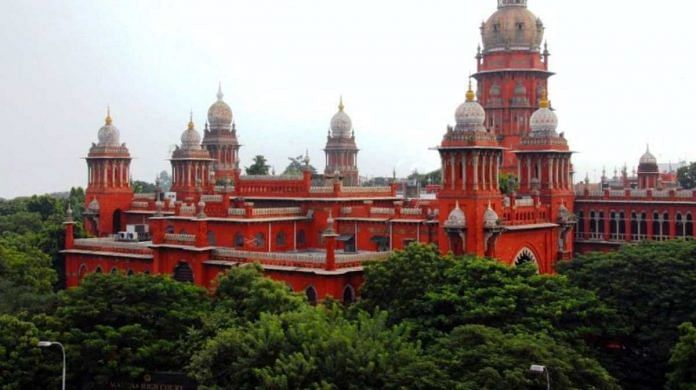New Delhi: The Madras High Court has suggested death penalty as punishment for corrupt practices such as demanding bribes and asked the central government to consider amending the law to impose stringent penalties to check corruption.
A division bench of justices N. Kirubakaran and B. Pugalendhi gave its order Monday, while hearing a public interest litigation filed by advocate A.P. Suryakrasam that sought action against state government officials for demanding bribes from farmers at paddy procurement centres. It called for a law similar to the one existing in China and North Korea.
“The central government may consider imposing punishment such as ‘hanging’ or ‘death penalty’ for corrupt practices or for demanding and accepting bribes like in China, North Korea, Indonesia, Thailand and Morocco,” the Madurai bench of the HC said.
It impleaded the Union home minister, the Union law minister and the Ministry of Parliamentary Affairs as a party in the case to know their view on the court’s suggestion.
The anti-corruption law — Prevention of Corruption Act (PCA) — is a central legislation and only the Centre can introduce amendments in it.
“People are compelled to accept corruption as normal one. Corruption has become deep-rooted and has spread like cancer. Every day, it is reported in the media that many officials are caught red-handed while taking bribes. Hence, the punishment needs to be enhanced,” the bench stated, citing reasons to deliberate further on the issue.
This is not the first time that courts have urged the need to revisit the anti-corruption law and strengthen it to tackle the menace of corruption, which has often been likened to cancer by courts.
The Supreme Court had in 2007 verbally remarked that the only deterrent to corruption was to “hang a few corrupt persons from the lamp post”. The bench led by Justice S.B. Sinha was hearing a bail application of an accused in the fodder scam.
Recently, a bench led by Justice Arun Mishra (now retired) also rued the fact that the law did not permit courts to give capital punishment for corruption. The oral remarks came while it was hearing a case related to Amrapali, which allegedly cheated lakhs of homebuyers.
Also read: What happens when corruption scandals hit the Supreme Court? Nothing
‘Act should be strengthened’
According to the petitioner, the officials at paddy procurement centres made the farmers pay bribes for days to sell their yields.
The officials, he alleged, were purchasing paddy from private traders, instead of the farmers, who were made to pay bribes so that their grains could be sold.
The Madras High Court observed that despite the existence of the Prevention of Corruption Act, 1947, corruption has not reduced.
“… this court is of the view that there should be a re-visit and the Act should be strengthened and stringent penalties should be imposed to curb the menace of corruption,” it said.
HC asks state for details on action taken against officials
The bench suo motu also impleaded the state agricultural department and cited media reports on raids conducted at a procurement centre in Tiruvallur district, which, the court said, supported the petitioner’s contention regarding corruption in the department.
The court asked for details with regard to action taken against officials, who have indulged in irregular or corrupt practices.
The bench was informed by the state counsel that the government had accepted the recommendation of a committee headed by Justice A.K. Rajan set up for the delegation of powers and fixing of accountability on every government servant at every stage and every level.
To know more on what action the state has taken on other suggestions of the committee to ensure a corruption free and transparent administration, the bench directed the state chief secretary, vigilance commissioner and the director of vigilance and anti-corruption to become parties to the case.
Also read: Can corruption charges against judge be made public before probe? SC to decide in Bhushan case




Amazing, coming from judiciary! But, death penalty will never be executed in India, as corruption may not be considered by the trial courts as “rarest of rare cases” justifying awarding of death penalty. The short point is that the governments do not intend to eradicate corruption. What the government cannot pay the Babus, they are allowed to collect from the public. That’s it.